From using the front burners to keeping spices on the counter, pediatricians share 14 things they avoid in their kitchens
Monica Humphries

- Insider spoke to five pediatricians about things they avoid in their kitchens.
- Unlocked spices, unlabeled cleaning supplies, and hot foods were some of their largest concerns.
- Locking cabinets and only cooking on the back burners were the pediatricians' biggest suggestions.
Between foods, fire, and chemicals, the kitchen is one room filled with dangers.
"The kitchen is the heart of your home," Dr. Amna Husain, a pediatrician, lactation consultant, and mother, told Insider. "And it's filled with all types of dangerous hazards."
Insider spoke with five pediatricians about how they babyproofed their kitchen.
Every pediatrician says they avoided using the front burners of their cookers at all costs. Instead, they opted for the back burners that are farther away.
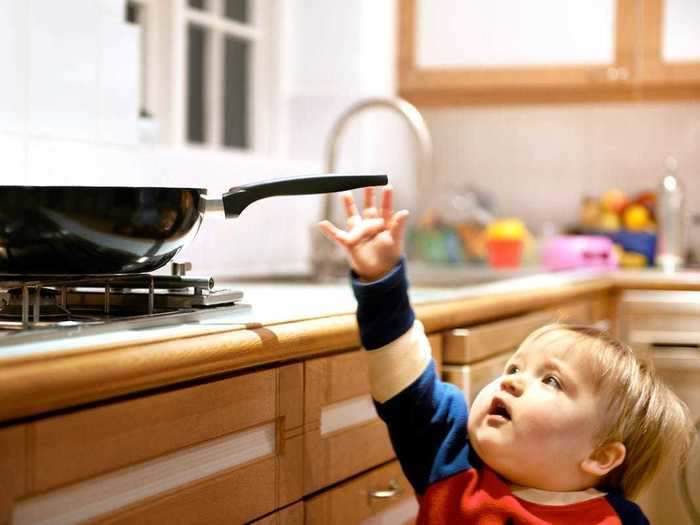
"We want to try to use those back burners and make sure we're turning the handles to the back," Dr. Meghan Martin, a pediatric emergency medicine physician at Johns Hopkins All Children's Hospital and mom of four, told Insider. "That little two-year-old could very easily walk and try to grab that handle and pull it down."
Dr. Nkeiruka Orajiaka, an ER pediatrician and mother of three, agreed. Plus, the burners can often stay hot once you're done cooking, so keeping them out of reach is necessary to prevent scald burns, which is one of the most common types of burns for toddlers and children, according to Johns Hopkins Medicine.
A scald burn can happen from something like tipping over hot liquids or too hot bathwater. Nearly 75% of these burns are preventable.
Some pediatricians suggest avoiding exposed stove knobs by keeping them covered.
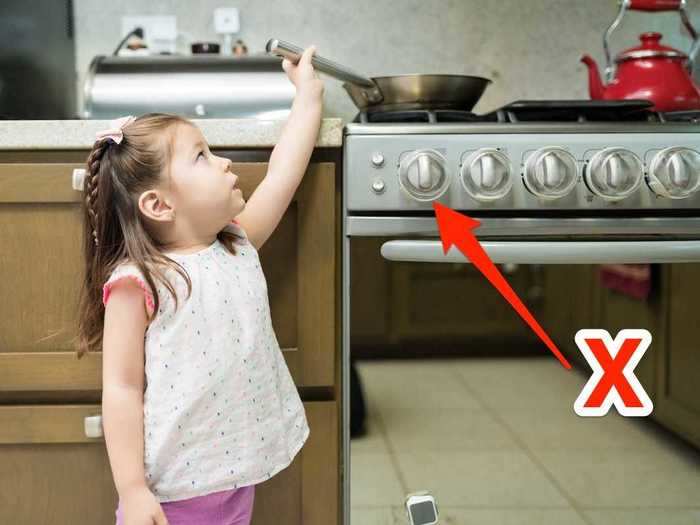
"It depends a lot on your oven, and it depends a lot on your child," Orajiaka said.
If your stove has knobs that are in a child's reach and your child is a curious explorer, it might be smart to add knob covers that can prevent a child from turning the stove on.
These covers prevent potential burns, and can also prevent fumes from unknowingly filling a home.
Some pediatricians say they also avoid easily accessible ovens by adding a lock.
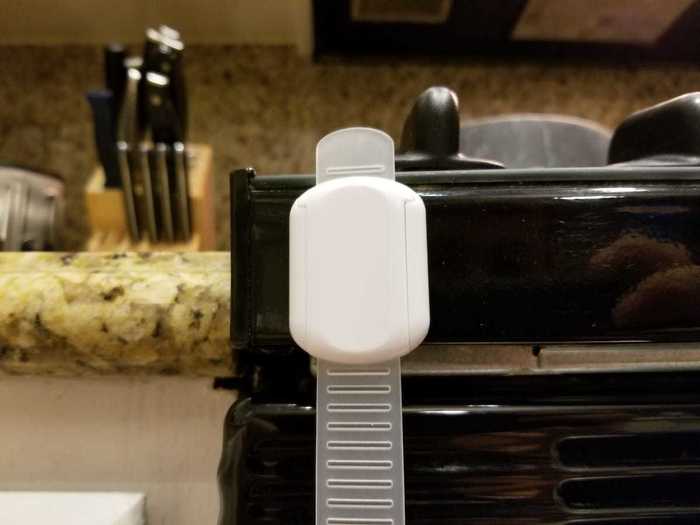
Similar to stove knob covers, consider a lock for the oven door.
This prevents a child from accidentally opening a hot oven, crawling into the oven, or having the oven door open onto a child.
The pediatricians also recommend locking cabinets with potentially harmful items, like cleaners, plastic bags, and heavy pots.
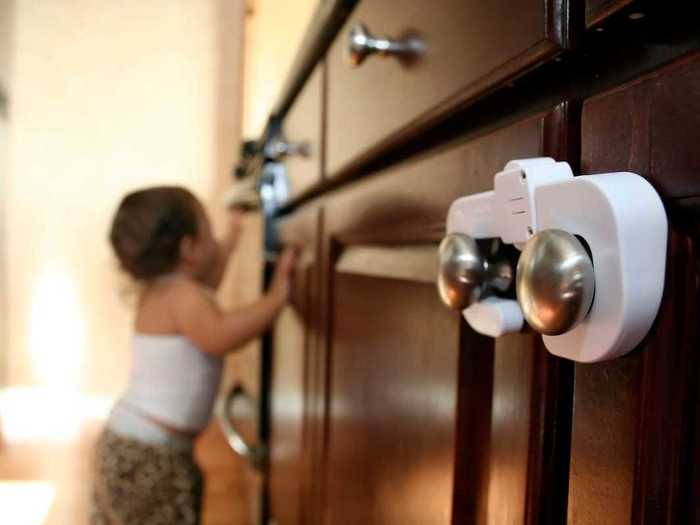
"Something that we didn't initially think about was the stuff under the kitchen cabinet," Martin said.
After realizing the variety of dangers tucked inside these cabinets — toxic cleaners, plastic bags that can lead to suffocation, and heavy pots — she made sure they were locked away.
Dr. Denise Nuñez, a pediatrician in a critical care unit in Bronx, New York, and a mother of two, also stressed the importance of keeping cabinets locks. Additionally, these locked cabinets mean no smashed fingers.
The pediatricians suggest keeping an eye out for kitchen appliances that have long cords and tucking appliances away when they're not in use.
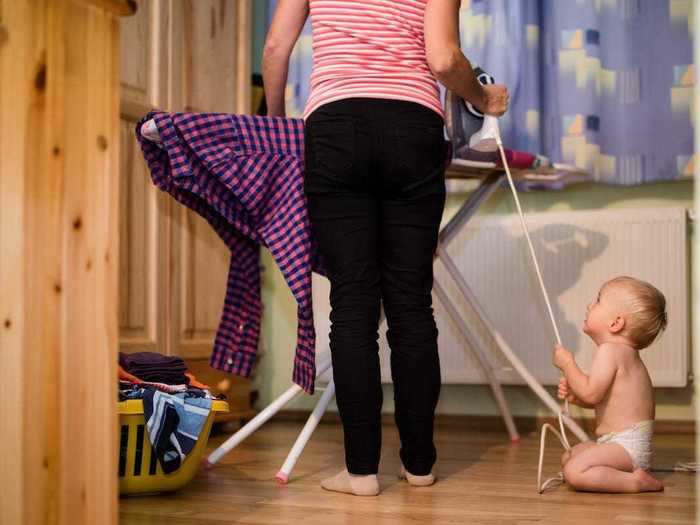
Dangling cords, whether from your stand mixer or microwave, pose a potential risk.
A child could pull down a heavy appliance and injure themselves, or a lengthy cord could strangulate or asphyxiate a child.
So when you're done using a kitchen appliance, store it in a place your child can't reach and keep the cord wrapped up.
Steer clear of keeping knives on the counter. Instead, place them up high and out of a child's reach.
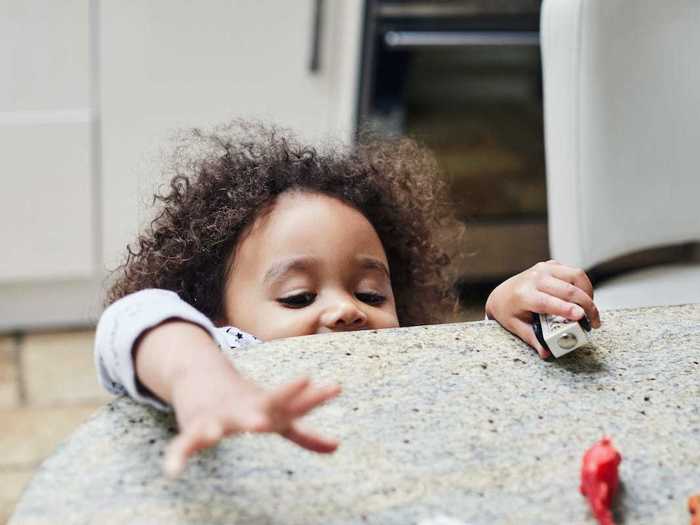
"The less intuitive things include keeping knives away from counter edges," Dr. Krupa Playforth, a pediatrician and mother of two, told Insider. "You want to make sure that they are pushed all the way back to the wall or that they're put away in a cabinet that is locked or high up."
While knives present a risk of injury in all ages, children are more likely to be injured while playing with a knife, according to a study in the National Library of Medicine.
The goal is to make sure a child never has a knife to play with or get ahold of, Husain said.
One pediatrician says spices shouldn't be left on the counter. Instead, store them out of a child's reach.
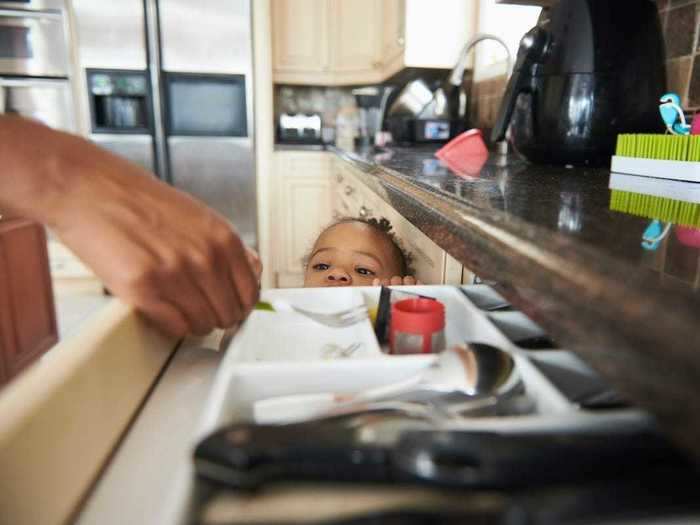
Along with cleaning products, Orajiaka also mentioned keeping spices out of a child's reach, as they can cause suffocation and harm to children.
"It's not recommended to store your spice containers low and in a way a child can reach them," she said.
Spices, like cinnamon and nutmeg, can cause asphyxiation, and suffocation is the leading injury-related death for children younger than 1, according to Injury Facts, a campaign by the National Safety Council.
These pediatricians avoided sharp corners by adding corner protectors.
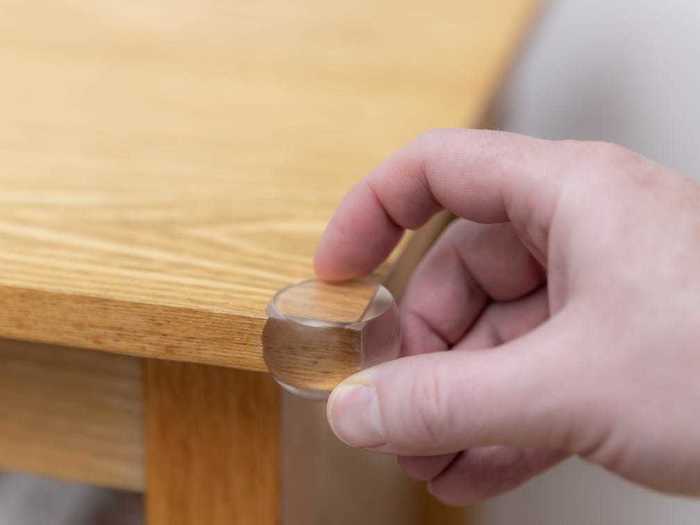
Husain said a toddler's changing height can make them susceptible to head injuries from the sharp corners of furniture, like counters and tables.
Husain said she's seen countless of these head injuries as a pediatrician, and Harvard Health Publishing reports that tens of thousands of children end up in the emergency room each year due to head injuries.
One way to help prevent head injuries in the home is to make sure all the sharp corners are covered and protected.
The pediatricians stress being aware of potential choking hazards and using the toilet paper tube method.
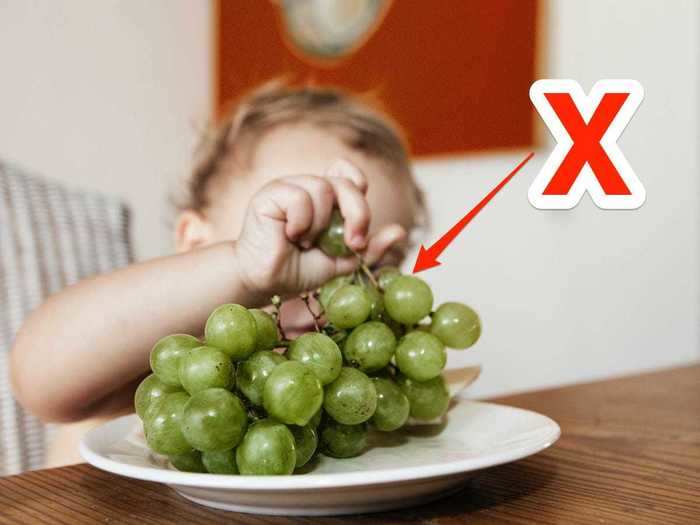
According to Healthy Children, children between the ages of 6 months and 3 years are at the highest risk for choking on food and non-food items.
Every pediatrician Insider spoke to said to be on the lookout for toys and foods with small pieces since they are a potential choking risk.
To decide if an item is a choking hazard, Husain and Orajiaka suggested the toilet paper tube test. If it can fit through the toilet paper tube, which is about 1.25 inches, it's a choking hazard.
Popcorn and grapes were the most frequently mentioned food items with a choking risk. Make sure to cut grapes into smaller pieces, and Husain recommends not giving children popcorn until they turn 4 years old.
Make sure every outlet is covered so curious toddlers don't get electrocuted.
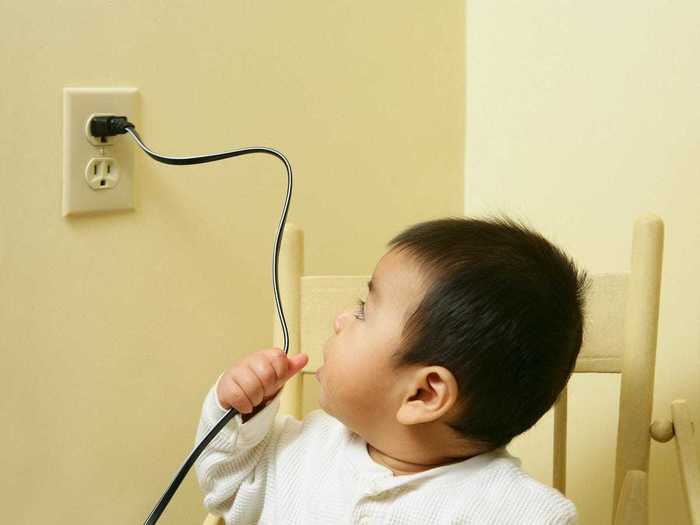
Every pediatrician mentioned using outlet covers throughout the home.
According to the Electrical Safety Foundation International, about 2,400 children receive treatment in the US for injuries related to electrical outlets.
In a survey by the foundation, nearly one-third of parents didn't cover their outlets. But that's one of the best ways to prevent electrical outlet injuries.
When purchasing outlet covers, look for ones that are tamper-resistant and don't have small pieces, which could be a choking hazard.
Orajiaka also suggested placing heavy furniture in front of the outlet so children can't reach it.
"Using furniture to cover it completely means they don't even have access to it," she said.
Avoid having dangerous liquids like dish soap, cleaners, and alcohol in unlabeled bottles so they're not mistaken for something else.
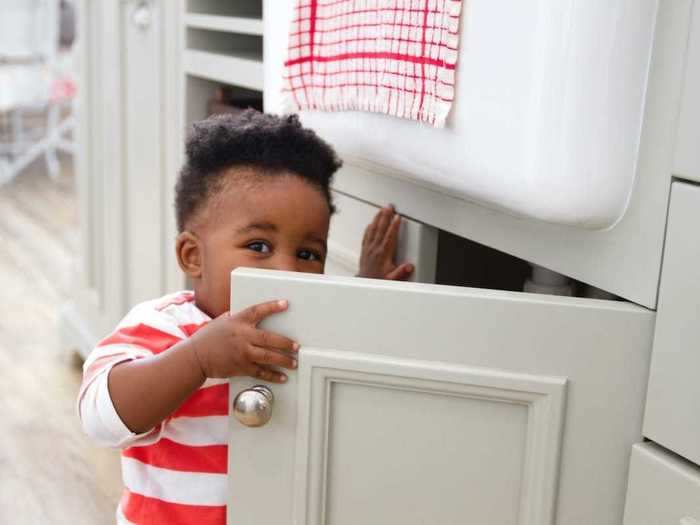
In addition to making sure items are locked away in cabinets, Martin suggested keeping things, like cleaners and alcohol, in their original packaging so you and your child know that it's not something fun to drink.
A lot of cleaning solutions and laundry detergents look like candy to a baby, Martin said.
"Kids think, 'You know, this blue liquid kind of looks like the Gatorade we gave them the other day or the juice they were drinking,'" she said. "So we need to make sure that it's in a safe place."
In a worst-case scenario, if a child does drink it, the parent knows exactly what they consumed if the bottle still has its packaging.
Some pediatricians say they ditched long tablecloths on their tables.
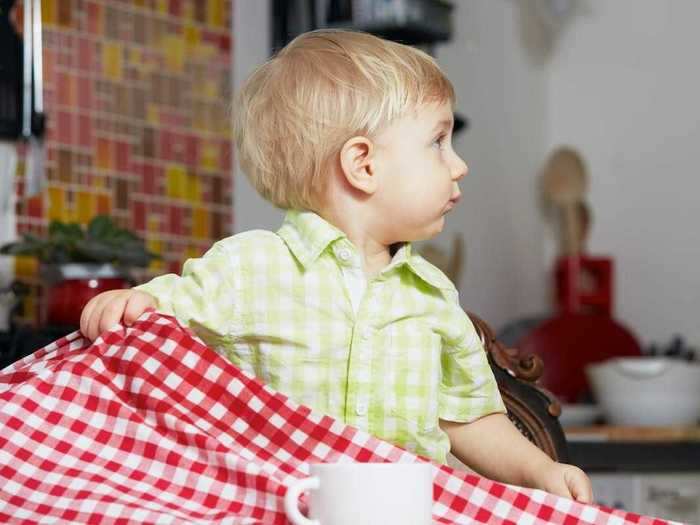
A tablecloth is a perfect thing for a child to grab onto and pull down, according to Playforth.
If there are any heavy objects or hot liquids, like coffee or tea, it could cause harm and burns.
One pediatrician also suggests keeping an eye on any hot foods at the edge of the counter.
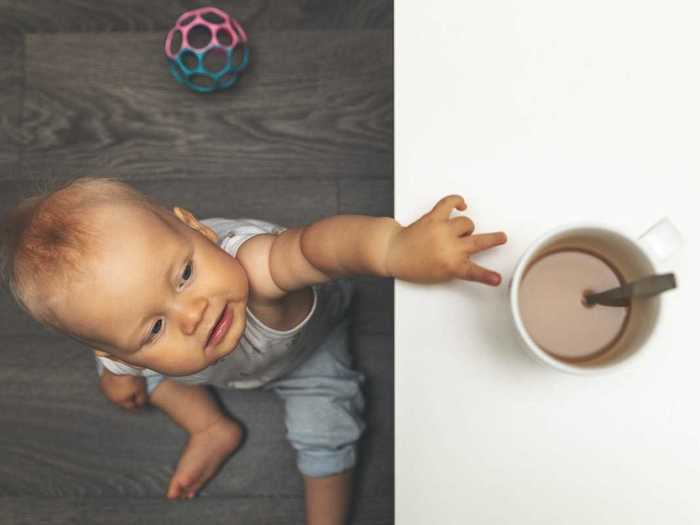
Most of the pediatricians urged parents to think twice about where they set their morning cup of coffee or tea on the counter.
"If it's still really hot, just off the stove or out of the microwave, we want to put it in a place that's safe," Martin said. "That way kid is not going to be able to grab it."
So if you're cooking or drinking something hot, keep it far back on the counter and out of reach.
Even in the kitchen, pediatricians say it's important to check that window blinds don't have long cords.
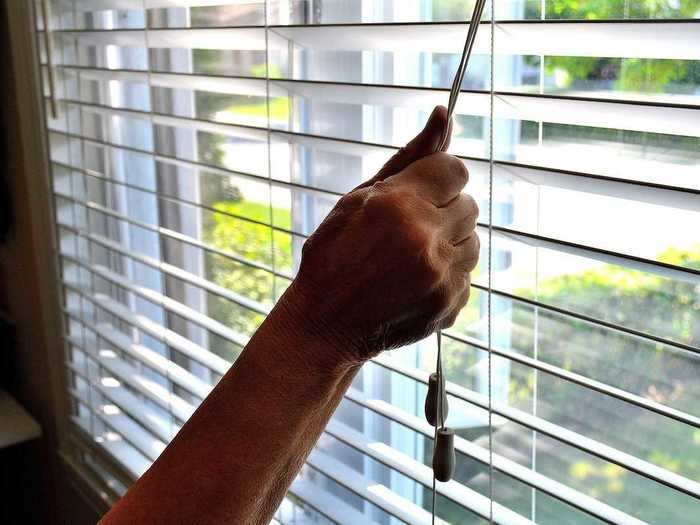
Especially if your home is older, be on the lookout for blinds with long, looped strings, the pediatricians warned.
These dangling strings pose a strangulation risk. Between 1990 and 2015, about two kids a day, or 17,000 children, went to the emergency room for injuries related to corded blinds, according to a study published in the journal Pediatrics.
If your home has these cords, cut the loop and purchase a cord winder or wrapper.
Fortunately, in 2018, a new safety standard was set and blind manufacturers were required to produce window coverings that are either cordless or have inaccessible cords, according to USA Today.
In addition to these recommendations, the pediatricians Insider spoke to also suggested saving poison control's phone number, taking a CPR class, and reading up on first aid tips.
With all these tips in mind, the pediatricians reminded families to cherish their time with their babies.
READ MORE ARTICLES ON
Popular Right Now
Popular Keywords
Advertisement